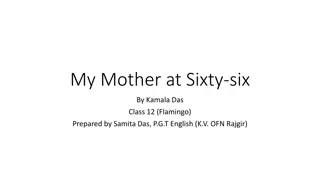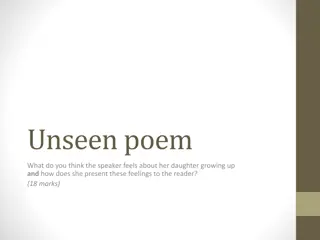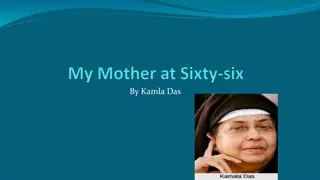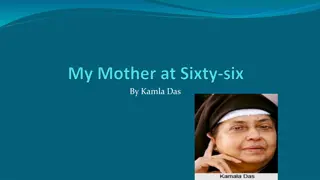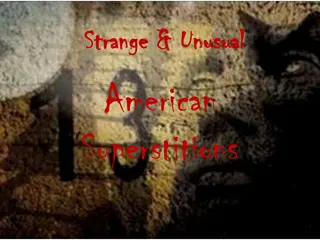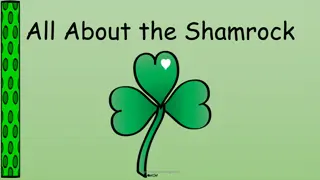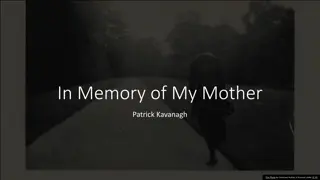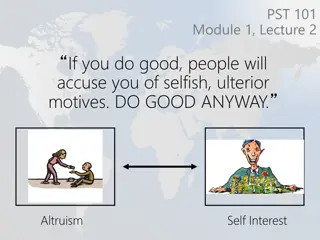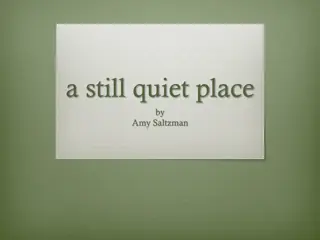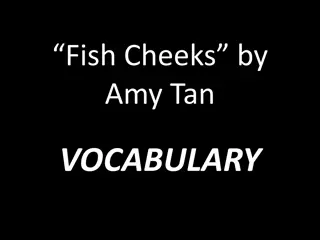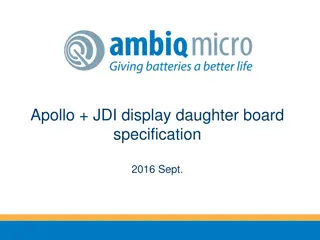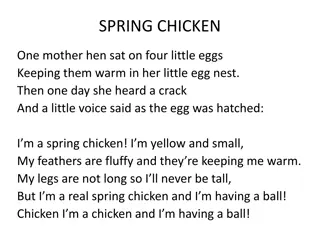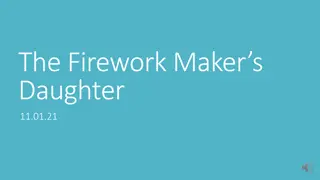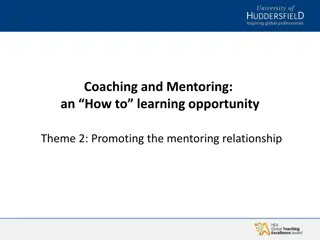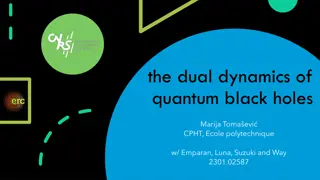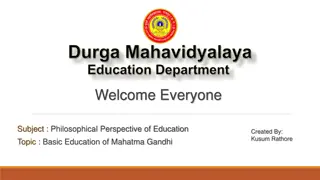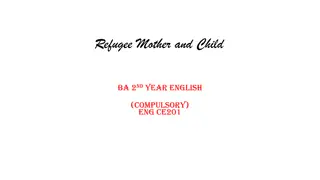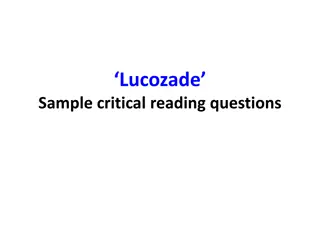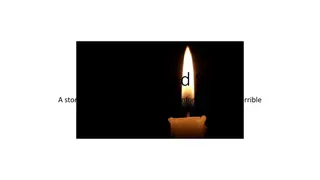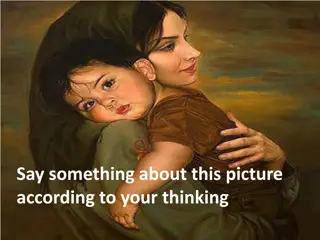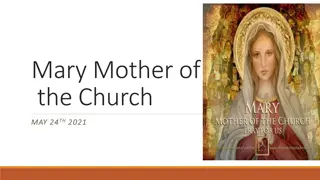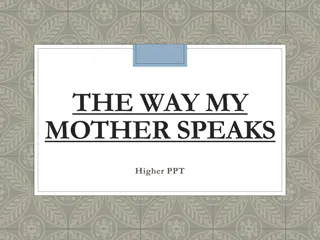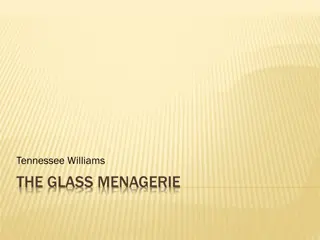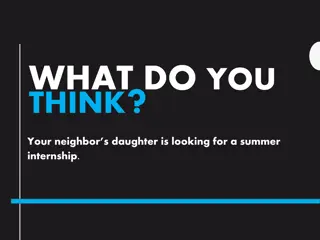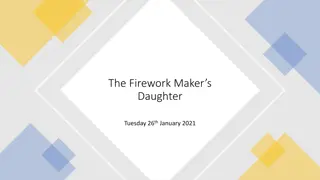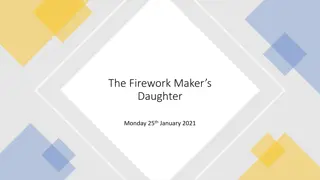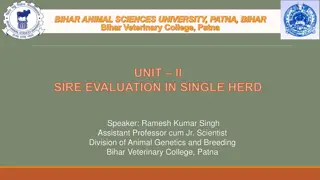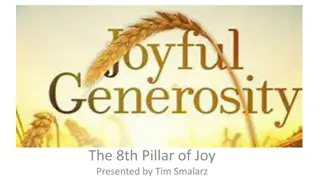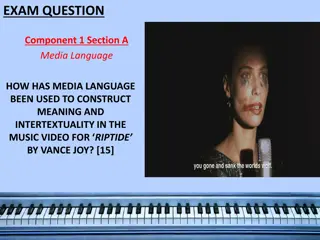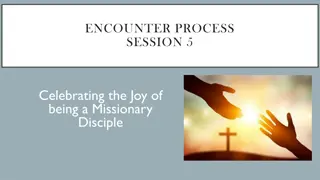Mother-Daughter Dynamics in Amy Tan's "The Joy Luck Club
The relationship between Suyuan and Jing-mei in Amy Tan's novel "The Joy Luck Club" reflects a clash of cultures and generations. Jing-mei's struggle for independence and identity as a second-generation Chinese-American leads to conflicts with her mother, Suyuan. Their dynamic evolves from defiance to understanding, symbolized by the gift of a piano and the realization that their bond is essential. The story showcases themes of cultural identity, family expectations, forgiveness, and the complexities of mother-daughter relationships.
Download Presentation

Please find below an Image/Link to download the presentation.
The content on the website is provided AS IS for your information and personal use only. It may not be sold, licensed, or shared on other websites without obtaining consent from the author. Download presentation by click this link. If you encounter any issues during the download, it is possible that the publisher has removed the file from their server.
E N D
Presentation Transcript
Dept. of English Language 4thGrade Lecture No. (6 Faculty of Arts Course Title Twentieth century novel and prose ( Instructor s Name: Sahar Amal
Chapter three: mothering as a transition in Amy Tan s The Joy Luck Club
Suyuan Woo and Jing Mei Furthermore, Jing-mei, who earlier resents her mother s determination from calling her a Chinese Shirley temple to forcing her to play the piano, now refuses not only to play anymore, but also decides not to listen to her mother And then I decided. I didn t have to do what my mother said anymore. I wasn t her slave. This wasn t China. I had listened to her before and look what happened (JLC 141). Jing-mei has the impression that since she lives in America, not in China, she is free to choose what she wants to be. Thus, Jing-mei rejects the Chinese culture which is bound by strict traditions. She also believes that she is not Chinese at all and this annoys Suyuan greatly. The ensuing struggle between Suyuan and Jing- mei demonstrates how stubborn Jing-mei is, that is to say, her strong will not to bend to her mother s wish continues:
Jing-mei : I ll never be the kind of daughter you want me to be! Suyuan: only two kinds of daughters, she shouted in Chinese. Those who are obedient and those who follow their own mind! Only one kind of daughter can live in this house. Obedient daughter. (JLC 142) Here, when Suyuan requests Jing-mei to be obedient which does not conform to the American culture, Jing-mei is filled with rage declaring that then I wish I wasn t your daughter then I wish I d never been born!... I wish I were dead! Like them (JLC 142). The pronoun them refers to her half-sisters whom her mother left in China, and Jing-mei does not know what has happened to them. This is a method of protecting herself because writing these words makes Jing-mei not only feel a sense of freedom, but also asserts her desire to hurt her mother as much as her mother hurts her.
A few years ago, when Suyuan gave Jing-mei the piano as a thirtieth birthday gift, Jing-mei regarded it as a sign of forgiveness [on Suyuan s part] (JLC 143). This gift is significant because it gives Jing-mei the opportunity to try playing the piano again, and it signifies the power of Suyuan s love for Jing-mei. After Suyuan s death, Jing-mei tries to play Pleading Child the same piece that she had played earlier so poorly at the recital when she was a child. Now she plays it easily and discovers that Schumann s music is composed of two parts Pleading Child and Perfectly Contented . As she plays the two pieces together, she realizes for the first time that they are two halves of the same song (JLC 144), and she suddenly understands that mother and daughter need each other to make a whole piece like the complementary halves of the same song.
Tan uses Schumanns music as a metaphor to highlight the relationship between mother and daughter. This relationship encompasses, like Schumann s music, two phases of the human experience. At times, these phases may appear to be contradictory, but, in fact, they are really two natural and complementary stages of life (Shen 14). This perfectly is the case with Suyuan and Jing-mei. Initially, the struggle between Suyuan and Jing-mei is brought out at the beginning of the Two Kinds chapter, but at the end of this chapter, their relationships become better. Interestingly, Jing-mei begins to see her mother in a new light. She has developed from a Pleading Child to a Perfectly Contented, although she is American, she is also Chinese. Therefore, she claims her Chinese heritage by obeying her mother who wants her to be successful in her life. As a consequence, Jing-mei articulates the fact that she loves belatedly the piano too much because it reminds her of her mother
By learning her mothers tragic story, Jing-mei becomes better equipped to restore her relationship with her mother. During this trip, her father explains the meaning of both her name and her mother s name. Concerning her name, Jing means pure essence , mei means younger sister . Suyuan s name means long -cherished wish . Now, Jing-mei comes to understand her mother s wish is to be the younger sister who was supposed to be the essence of the others as her full name means. What Tan here means by others is Jing-mei s other two sisters. After learning the connotation of these names, she feels sorrowful I feed myself with the old grief, wondering how disappointed my mother must have been (JLC 281).
Now, with a new consciousness, Jing-mei begins to see her mother in a new light. That is to say that Jing-mei finds her Chinese identity and renewed sense of her dead mother through two situations, one is physical and the second is emotional. Tan can explain the emotional situation when Jing-mei meets her Chinese half-sisters: And then I see her. Her short hair. Her small body and now I see her again, two of her waving As soon as I get beyond the gate, we run toward each other, all three of us embracing all hesitations and Mama, Mama, we all murmur, as if she is among us I look at their face again and I see no trace of my mother in them. Yet they still look familiar. And now I also see what part of me is Chinese. It is so obvious. It is my family. It is in our blood. After all these years, it can finally be let go. (JLC 287-88) expectations forgotten.
Further, when Jing-mei arrives in China, she feels that she is becoming Chinese (JLC 267). Earlier, she remembers her full rejection of anything Chinese. This is related to the personality development theory which suggests that teenagers behave in a way that is characterized as totalism. This means that there is a setting of absolute boundaries in one s values, beliefs and interpersonal relationships (qtd in Ryckman 186). During her adolescence, Jing-mei believes that anything American is better. Jing-mei s cynical remark concerning anything Chinese is evident in A Pair of Tickets chapter. When Suyuan tells Jing-mei [Chinese] is in your blood, Jing-mei seems to be more upset to have heard these words from her mother.
[A] warewolf, a mutant tag of DNA suddenly triggered, replicating itself insidiously into a syndrome, a cluster of telltale Chinese behaviors, all those things my mother did to embarrass me haggling with store owners, pecking her mouth with a toothpick in public, being color-blind to the fact that lemon yellow and pale pink are not good combinations for winter clothes. (JLC 267) Jing-mei views both her mother and the Chinese things that her mother does as ugly and backward. It is clear that Jing-mei believes that Chinese values are of a lower standard compared to American values.
Tan uses symbols merely to indicate how daughters deep attachment to their mothers is, and also to disclose the Chinese culture that is passed from mothers to daughters. This gets reflected in the Best Quality chapter in which Jing-mei explains to the reader why Suyuan does give her the jade pendant and the underlying connotation. For Jing-mei, the Chinese New Year is an unhappy occasion. To celebrate the Chinese New Year, Suyuan has invited eight people to join her family for crab dinner. Suyuan s family includes Canning, Jing-mei and herself. The eight people are Lindo, Tin Jong, Vincent, Lisa; Vincent s girlfriend, Waverly, Rich, Shoshana, and Mr.Chong. So, the attendants become eleven. While Suyuan has accompanied Jing-mei to the market to buy crabs, Suyuan has carefully selected the feistiest crabs explaining to Jing-mei that they are of best quality. When she poked to find the liveliest crabs, she found one losing a limb. She refused to take it for a missing leg is a bad sign on Chinese New Year (JLC 200). After a long discussion, the fishmonger gives Suyuan the mutilated crab for free. Suyuan has not counted Shoshana, so she has bought only ten crabs. When she sees the extra person, she decides to cook the eleventh crab.
During dinner, Waverly and Jing-mei begin to dispute about business agreement. Waverly criticizes Jing-mei s hairdresser, calling him gay and warning he probably has AIDS. Jing-mei retaliates Waverly mentioning that her work or firm has not paid her for a freelance advertising sales pitch she has done for them. Waverly retorts that her quality of work is unacceptable. Knowing that Jing-mei has been humiliated intensely by Waverly, Suyuan gives Jing-mei the jade pendant and tells her that it represents the importance of life. Jing-mei thinks that her mother s present is to comfort her partly, but Suyuan asserts that this is not the reason.
At this moment, Suyuan begins to recognize the fundamental differences between Jing-mei s and Waverly s personalities and motivations. These differences are demonstrated clearly when Waverly and everyone on the table have picked the best crabs, except Suyuan and Jing-mei. On the contrary, Jing-mei has picked the bad crab in order to give her mother a better one as Suyuan expects only you pick that crab. Nobody else take it. I already know this. Everybody else wants best quality. You thinking different (JLC 208). Suyuan sees this virtue as a kind of generosity and selflessness. Therefore, Suyuan gives her the necklace, which is of the best quality, and makes Jing-mei recognize her own worth. Suyuan is proud of Jing-mei because she has inherited the same traits of modesty and selflessness from her, like the pendant. As a result, Suyuan does not value Waverly and makes a metaphorical connection between Waverly and the crab She is like this crab always walking sideways, moving crooked (JLC 208). Suyuan advises Jing-mei not to listen to Waverly and to move in a different direction You can move your legs go the other way (JLC 208). That is to say that Suyuan wants Jing-mei to think for herself and value herself.
According to Tan, the pendant has different interpretations in the novel. As Jing-mei observes that at first she does not like wearing the pendant because it signifies the cultural differences between Suyuan and Jing-mei To me, the whole effect looked wrong: too large, too green, too garishly ornate (JLC 197). She remarks that the other Chinese people who are wearing similar pendants do know the meaning it s as though we were all sworn to the same secret covenant, so secret we don t even know what we belong to (JLC 198). Then, she wonders if the pendant has a specific meaning and thus asks whether the aunties or the Chinese friends can read the pendant. She acknowledges that if they interpret its meaning, it will be different from what her mother intends. Only after Suyuan s death, Jing- mei has come to realize its meaning I wore this on my skin, so when you put it on your skin, then you know my meaning. This is your life s importance (JLC 208). Here, Suyuan believes that the pendant will not only transfer the Chinese culture but also the love from mother to daughter. Finally, the jade pendant is a symbol of the importance of passing down the Chinese culture from Suyuan to Jing-mei.
Besides, Tan uses food to represent the loving bond between mother and daughter. This is evident when Waverly criticizes Jing-mei s writing style, and Suyuan responds with a subtle insult June not sophisticate like you. Must be born this way. From Suyuan s remark, Jing-mei feels humiliated and betrayed, but the following lines prove the contrary as she realizes I could hear my mother eating an orange slice. She was the only person I knew who crunched oranges, making it sound as if she were eating crisp apples instead. The sound of it was worse than gnashing teeth (JLC 206). Gnashing her teeth signifies Suyuan s anger as Hsiao puts it and continues saying: She has no choice but to transform her anger into crunching (209-10).
Tan uses the mah jong game to depict numerous and diverse ideas. Crucial to analyzing theme and structure of the novel, is to define briefly what the mah jong game is and how Tan uses it successfully as both simile and symbolic devices. Mah jong is a popular Chinese game which involves four players just as the novel involves four mothers. It is Ronald Emerick who gives the reader an overview about the structure of the mah jong game A complete game of mah jong requires at least sixteen hands: four rounds, each consisting of four hands and each hand representing one of the four players- or one of the four winds (55). It is obvious that the novel is structured somewhat like the mah jong game. It is divided into four sections, each section consisting of four parts and each part representing one of the four mothers or one of the four daughters (Emerick 55).
The structure of the novel reflects the generational gap between mothers and daughters as Walter Shear points out Tan organizes her material in terms of a generational contrast by segregating stories of mothers and their daughters (17). In the first and the last sections, the four mothers tell about their lives in pre-1949 China, except for Suyuan who has died and her stories are narrated by Jing-mei. The second and the third sections include the four daughters who tell their stories of growing up in America and their marriage problems. In the first chapter, the Joy Luck Club, Suyuan explains to Jing-mei the difference between the Jewish version of mah jong and the Chinese mah jong Jewish mah jong, they watch only for their own tile, play only with their eyes Chinese mah jong, you must play using your head, very tricky (JLC 33). The difference lies in the fact that the Chinese game is characterized by strategy. Thus, Tan makes a comparison between the four players and the four daughters that is demonstrated by Emerick the four daughters, like four players in a mah jong game, must learn to combine strategy and luck if they hope to succeed in the game of life. Specifically, they must learn the joy luck philosophy of the four experienced mah jong players of the novel, their mothers (60-61). The importance of the game itself, on the part of the mothers, is to teach their daughters how to succeed in their lives by adopting a strategy just as each player must devise it for winning. The main target of the game is similar to the main target of the four mothers who want their daughters to be successful in their lives. Moreover, the mothers want their daughters to see the world through their Chinese eyes. To conclude, the mah jong game symbolizes a link between mothers and daughters, a cultural bridge between the past and the present, a tradition that can be transferred from one generation to the next (Emerick 60).
The four mothers occupy a specific position, Suyuan is in the East, An- mei represents the South, Lindo occupies the West, and Ying-ying sits in the North. As Anthony Christie reflects, The four sides of the mah jong table symbolize the four points of the compass and four seasons (46-47). The East represents spring, the South represents summer; the West represents autumn; and the North represents winter. Jing-mei sits in her mother s place on the east side where things begin the direction from which the sun rises, where the wind comes from (JLC 33). Tan uses the East to symbolize China in which the four mothers have lived, and also to represent Jing-mei. It is appropriate for Jing-mei to sit on the east side since the novel ends with her momentous trip to China. Accepting her mother s role in the mah jong game indicates that it is a first step toward understanding her mother at the end of the novel and also makes a connection between her mother s generation and her own.
Best regards Best regards Dr. Sahar Sahar Amal Dr. Amal Kamal Kamal


